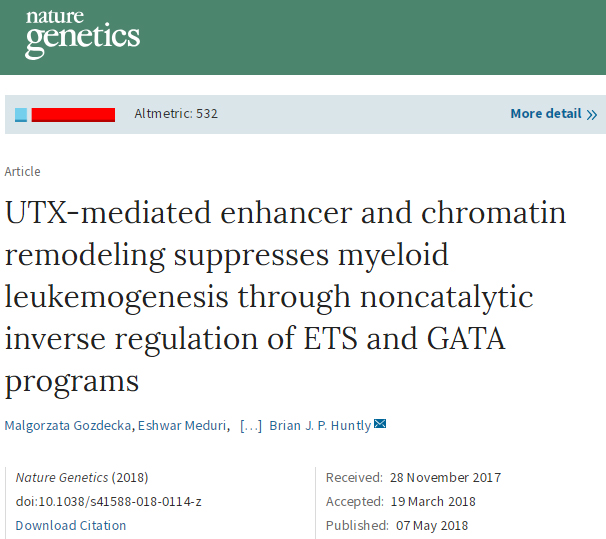Release date: 2018-05-10
Scientists from the Wellcome Sanger Institute and the University of Cambridge have discovered the first protective gene for leukemia on the male Y chromosome that can inhibit the development of acute myeloid leukemia (AML) and other cancers.
This study was published in Nature Genetics under the title "UTX-mediated enhancer and chromatin remodeling suppresses myeloid leukemogenesis through noncatalytic inverse regulation of ETS and GATA programs".

Doi:10.1038/s41588-018-0114-z
The researchers found that the absence of the X-chromosome gene UTX (a mutation that occurs in many tumors) accelerates the development of AML. While UTY is a related gene on the Y chromosome, it protects male mice lacking UTX from AML. They subsequently found that in AML and several other human cancers, the loss of UTX was accompanied by the loss of UTY, confirming that the anti-cancer effect of UTY extends beyond AML.
New features of Y-specific genes
Women have two X chromosomes, while men have one X and one Y chromosome. The X chromosome and the Y chromosome share many genes, but only a few genes (including UTY) are found only on the Y chromosome. These Y-specific genes are thought to contain the genetic information needed for male traits, but are not clear about other potential functions. Now, the mining of new features of the UTY gene has changed the research perspective of the Y chromosome and improved understanding of how AML and other cancers develop.
The first author of the article, Dr. Malgorzata Gozdecka from the Wellcome Sanger Institute, said: "This is the first Y-chromosome-specific gene for AML. It was previously thought that the only function of the Y chromosome was to produce male features, but our findings indicate The Y chromosome also prevents AML and other cancers."
Professor Brian Huntly of the University Hospital of Cambridge, UK, said: "As men age, men usually lose the Y chromosome from their cells, but its significance is unclear. Our study reinforces the argument that Y chromosome loss may increase cancer risk and describes The mechanism by which this can happen."
Key genes that inhibit leukemia
In their study, the researchers studied the UTX genes in human cells and mice in an attempt to understand their role in AML. In addition to discovering that UTY is a tumor suppressor gene, scientists have also discovered a new mechanism by which UTX deficiency leads to AML. Specifically, they found UTX as a common "scaffold" that aggregates a large number of regulatory proteins that control DNA and gene expression. This function can also be performed by UTY. When UTX / UTY is absent, these proteins do not properly regulate gene expression, and cancer growth is more likely to occur.
Dr. George Vassiliou, co-project director of the Wellcome Sanger Institute and consultant to the NHS Trust Fund at Cambridge University Hospital, said: "The treatment of AML has not changed for decades, and the need for new therapies has not been met. This study helps us understand AML. The development and provide clues to the process by which we develop new drug targets to disrupt leukemia, and we hope that this research will provide new research ideas for treatment and improve the lives of AML patients.
Dr. Alasdair Rankin, Bloodwise Research Director, said: "The survival rate of AML is very low. The current treatment involves strong chemotherapy, usually combined with stem cell transplantation, but this can only cure a small number of patients. This important study will help to understand more fully. What is genetically altered in this highly invasive leukemia, understanding this process is the key to developing AML-targeted drugs, thus keeping us away from painful and often ineffective, chemotherapy-based treatments."
Source: Bio-Exploration
Wenzhou Celecare Medical Instruments Co.,Ltd , https://www.wzcelecare.com